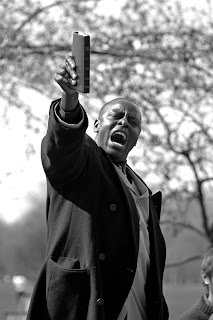By way of introduction I would like to state that I grew up listening to Bob Marley. During my childhood I heard Dad play a lot of Marley on the family record player as he relaxed after hours or over the weekend. Over the years I developed a liking for the man's music. I liked a lot of things about the music; the rhythm of the music, I liked the pulsating bass lines, I liked Bob's evocative vocal delivery, I liked the celebration of life captured in the lyrics and I liked the poignant cries for justice in the music. Simply put I believed that Bob was one of the greatest artists of all time.

These days I do not listen to a lot of Marley. The primary reason being after I trusted in Christ, I wanted everything in my life to be primarily about Jesus. This involved modifying the kind and amount of entertainment that I consumed. Pretty early on in my process of developing a "Christian Entertainment Policy", a number of Marley's songs began to strike me as disturbing and in some cases anti-Christian. One song that fell into the disturbing and anti – Christian category was the classic "Get up Stand Up!"

‘Get Up Stand Up!’, was originally released on the Wailers album ‘Burning’ and has subsequently been released in a number of compilations. Most music critics agree that this song is one of Marley's strongest songs lyrically and musically. The song was and has been loved by the record buying public for over three decades and remains one of the artist’s signature tunes. On a personal level the song was one of my favorites, I was particularly moved by Peter Tosh's verse. Listening to his delivery just made me tingle. So with credentials like that what's my beef? Basically, the message in the music is not just non Christian, it is anti Christian. Let’s walk through the song verse by verse and see what I am talking about.

Get up, stand up: stand up for your rights!
Get up, stand up: stand up for your rights!
Get up, stand up: stand up for your rights!
Get up, stand up: don't give up the fight!
.jpg)
The song starts with its famous infectious chorus. As a point of interest most people I know that are familiar with the song can only remember these four lines! The Chorus contains a mere nine words and takes twenty three seconds to deliver, but to Marley fans, they are pregnant with meaning. Since the early seventies, fans have identified with these lyrics as an anthem of resistance against injustice. As a Christian I do not have beef with the Chorus per se since if the Apostle Paul is to be taken as an example there are times that Christians can 'stand up for their rights' Acts 25:11.

Preacher man, don't tell me, Heaven is under the earth.
I know you don't know What life is really worth.
It's not all that glitters is gold;
Alf the story has never been told:
So now you see the light, eh!
Stand up for your rights. come on!
After reading the lyrics it is clear that Marley has beef with Christianity. In his view Christianity values life in heaven over and against life on earth. Marley implies that these beliefs keep Christians from acting against injustice in this world. Okay, that’s Marley’s position. The question is, whether his position is fair or true? I believe it would be true to say that as Christians our ethics are shaped by the Bibles teaching on creation, fall, redemption, judgment and the “final state”. When making decisions about life the Christian will bear in mind that this life is passing away and the eternal state is yet to come. I believe that Marley is however wrong to believe that Christianity does not value life on earth or is not concerned with justice in this life. The Bible has much to say on the topic of justice on sthis side of Judgment day. Just read through Amos Chapter 5 to get a flavour of God's concern for justice in this life. It follows that if God is concerned with injustice in this life so should the Christian, however, they are to bear in mind that ultimately the second coming of Christ will right every wrong and wipe the tear out of every believer’s eye. So in conclusion, Marley is right that the Christian belief in the coming kingdom influences their decisions, but he is wrong to believe that this leads to indifference about Justice in this life.

Get up, stand up: stand up for your rights!
Get up, stand up: don't give up the fight!
Get up, stand up: stand up for your rights!
Get up, stand up: don't give up the fight!
Most people think, Great god will come from the skies,
Take away everything And make everybody feel high.
But if you know what life is worth, You will look for yours on earth:
And now you see the light,
You stand up for your rights. jah!
In this verse Marley steps up the anti – Christian rhetoric. Marley tells the believer that they are not to place their hope in Christ’s kingdom but rather seek justice in this life. Well, there is a lot that can be said about this but I will say these three things. Firstly, on a purely human level Marley is naïve! Human action has never resulted in justice and peace. History proves this. Secondly, Marley sidesteps Christian arguments for the second coming. In order for Marley’s position to be taken seriously, it ought to wrestle with the claims of Christianity and not simply dismiss them. While there is not enough space in this blog to give an adequate response to Marley taunts but, there are several excellent arguments for God’s existence and the fact that he will return to judge the world. Among these are; Mere Christianity by C.S. Lewis, The God Who is There by Francis Shaffer, The Reason for God by Tim Keller and Simply Christian by N.T. Wright. Thirdly, this verse makes Bob Marley a denier of God's word and this makes the song unsuitable for Christian listening.

Get up, stand up! (jah, jah! )
Stand up for your rights! (oh-hoo! )
Get up, stand up! (get up, stand up! )
Don't give up the fight! (life is your right! )
Get up, stand up! (so we can't give up the fight! )
Stand up for your rights! (lord, lord! )
Get up, stand up! (keep on struggling on! )
Don't give up the fight! (yeah! )
We sick an' tired of-a your ism-skism game -
Dyin' 'n' goin' to heaven in-a Jesus' name, lord.
We know when we understand:
Almighty god is a living man.
You can fool some people sometimes,
But you can't fool all the people all the time.
So now we see the light (what you gonna do?),
We gonna stand up for our rights! (yeah, yeah, yeah! )

In this verse Peter Tosh questions the Christian belief in the afterlife and the Christian concept of God. Let’s deal with Tosh’s position on the afterlife. I believe that as the person denying the proposition that there is an after life; Tosh must prove that there is not afterlife. While skeptics may say that there is no empirical (sense based) evidence of life after death, skeptics cannot prove that life does not continue after death in a way that cannot be established by our senses. Put another way. Tosh does not and I would argue cannot prove his point and therefore should not be taken seriously. Moving on to Tosh’s assertion that humans are God (or gods?). It is true that the Bible speaks of humanity as being in the image of God and the man Jesus Christ as being God, however, the idea in the song is that God is part of creation which is just not true. The concept of God, holds that an eternal, all powerful and eternal being created and is in control of the universe. Humans like you and me just do not qualify as God. Me are limited beings who can not determine whether we will wake up tomorrow. This is however, not to say that humans have no worth. On the contrary, the Christian believes, on the basis of the Bible, that all people are created in the image of God and as a result must be treated with a certain dignity. This verse is anti – Christian in the extreme and should not be listened to by Christians as entertainment.
So that’s it, Bob Marley’s classic, musically entertaining but anti – Christian in its message. It is more than an anthem against the injustices men commit against each other it is an anthem of mans rebellion against God.











.jpg)


















